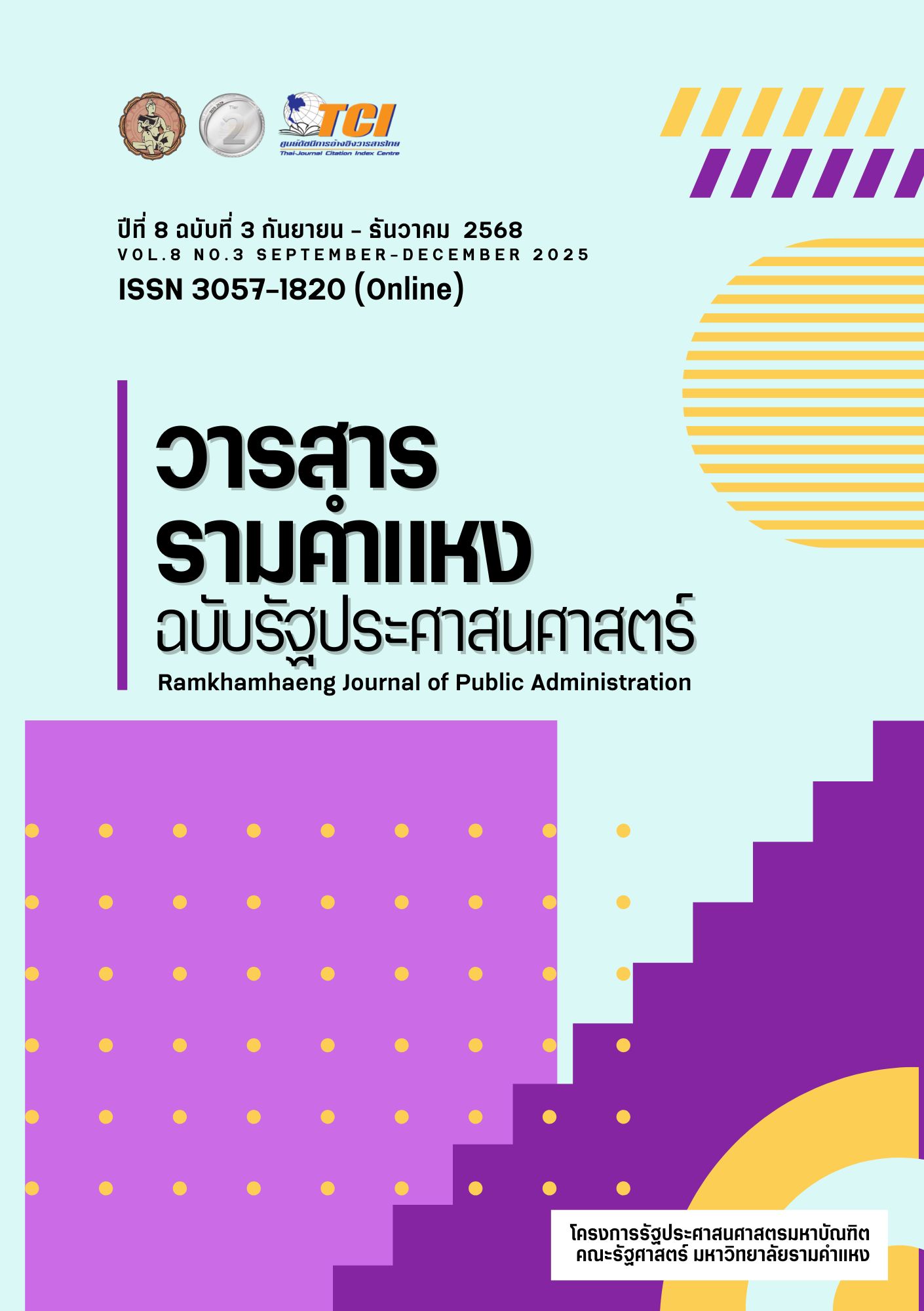Quality of Life for Contracted Government Workers: A Comparative Analysis in the Northeastern region
Keywords:
Quality of Life, Outsourced Employees, Government AgenciesAbstract
This research aimed to 1) study the quality of life of outsourced service employees, 2) examine the perceptions of administrators and outsourced service employees in government agencies in Northeastern Thailand, and 3) explore problems and guidelines for improving their quality of life. A mixed methods research design was employed, integrating quantitative and qualitative data collection to provide comprehensive insights. Quantitative data were obtained from 50 outsourced service employees using the WHOQOL-BREF-THAI questionnaire, which covered four dimensions: physical health, psychological health, social relationships, and environment. Data were analyzed using descriptive statistics. Qualitative data were collected through in-depth interviews with 42 administrators and outsourced service employees and analyzed using coding and thematic analysis.
The results revealed that most outsourced service employees had a moderate level of quality of life. Key influencing factors included appropriate compensation, working environment, and opportunities for skill development. Respondents agreed that compensation was inconsistent with workload and lacked adequate welfare. Both administrators and employees shared the view that compensation and welfare should be improved. Recommendations include enhancing welfare benefits, promoting job security, and fostering recognition of the value of outsourced service employees.
References
ชนิดา เล็บครุฑ. (2562). การรับรู้การสนับสนุนจากองค์การและผู้บังคับบัญชาที่มีผลต่อความผูกพันในงานของพนักงานจ้างเหมาบริการ: กรณีศึกษาหน่วยงานภาครัฐแห่งหนึ่ง. วิทยานิพนธ์ปริญญามหาบัณฑิต, มหาวิทยาลัยธรรมศาสตร์.
ดวงใจ วุฒิประเสริฐ. (2561). ปัจจัยที่มีผลต่อความพึงพอใจในการปฏิบัติงานของบุคลากรสายสนับสนุนวิชาการมหาวิทยาลัยราชภัฏสวนสุนันทา. วารสารบริหารศาสตร์ มหาวิทยาลัยราชภัฏสวนสุนันทา, 1(1), 49-64.
ธนัชพร กบิลฤทธิวัฒน์. (2558). ความคาดหวังและความพึงพอใจในการปฏิบัติงานของพนักงานราชการในหน่วยงานสังกัดกระทรวงสาธารณสุข. วิทยานิพนธ์ปริญญามหาบัณฑิต, มหาวิทยาลัยธรรมศาสตร์.
ธีระพงษ์ โสดาศรี. (2561). การศึกษาค่าตอบแทนและสวัสดิการของพนักงานจ้างเหมาบริการในหน่วยงานภาครัฐ: กรณีศึกษากรมบัญชีกลาง. วิทยานิพนธ์ปริญญามหาบัณฑิต, มหาวิทยาลัยสุโขทัยธรรมาธิราช.
นฤมล สุขสมาน. (2560). ความพึงพอใจในการทางานของพนักงานจ้างเหมาบริการในบริษัทเอกชนแห่งหนึ่ง. วิทยานิพนธ์ปริญญามหาบัณฑิต, มหาวิทยาลัยธรรมศาสตร์.
บุญเลิศ บูรณุปกรณ์. (2559). ความพึงพอใจในการปฏิบัติงานของพนักงานจ้างเหมาบริการขององค์กรปกครองส่วนท้องถิ่นในเขตอำเภอเมืองเชียงใหม่. การค้นคว้าอิสระปริญญามหาบัณฑิต, มหาวิทยาลัยเชียงใหม่.
พรชัย นาคสีทอง. (2560). ความเหลื่อมล้ำในการจ้างงานภาครัฐไทย: กรณีศึกษาพนักงานจ้างเหมาบริการ. วารสารสังคมศาสตร์ มหาวิทยาลัยศรีนครินทรวิโรฒ, 20(2), 120-133.
พิชิต พิทักษ์เทพสมบัติ, สุภาพร สุขเกษม, และศิริวรรณ เสรีรัตน์. (2558). ความพึงพอใจในงานและความผูกพันต่อองค์การ: ความหมาย ทฤษฎี วิธีวิจัย การวัด และงานวิจัย. วารสารบริหารธุรกิจ 38(148), 85-108.
รัชนีวรรณ วนิชย์ถนอม. (2560). แรงจูงใจในการปฏิบัติงานของพนักงานราชการ: กรณีศึกษากรมประมง. วารสารรัฐประศาสนศาสตร์, 15(3), 121-144.
วรรณภา ทองแดง. (2561). บรรยากาศองค์การและการสนับสนุนจากผู้บังคับบัญชาที่ส่งผลต่อประสิทธิภาพการปฏิบัติงานของบุคลากรสายสนับสนุนวิชาการมหาวิทยาลัยราชภัฏสวนสุนันทา. วารสารวิทยาการจัดการมหาวิทยาลัยราชภัฏสวนสุนันทา, 1(1), 1-14.
วรรณวิมล นาคทอง. (2561). ความคาดหวังและความพึงพอใจในการปฏิบัติงานของพนักงานจ้างเหมาบริการในสถาบันอุดมศึกษา. วิทยานิพนธ์. มหาวิทยาลัยศิลปากร นครปฐม.
สุวัฒน์ มหัตนิรันดร์กุล, วิชา เขียวอ่อน, สร้อย, & เข็มทอง จิตราภรณ์. (2540). แบบวัดคุณภาพชีวิตขององค์การอนามัยโลกชุดย่อฉบับภาษาไทย (WHOQOL-BREF-THAI). กรมสุขภาพจิต, กระทรวงสาธารณสุข. https://doi.org
Alromaihi, R., Pilbeam, S., & Khalifa, G. (2017). Job Satisfaction and Employee Performance in the Banking Sector in the Kingdom of Bahrain. International Business Research, 10(11), 1-12.
Anjum, M., Ming, X., Siddiqi, A. F., & Rasool, F. (2018). Motivation and Job Satisfaction of Contract Workers: A Study of Pakistan. Sustainability, 10(6), 1822.
Bernolak, I. (2017). The Relationship Between Salary and Job Satisfaction of Contractual Workers: A Comparative Study. International Journal of Management and Applied Science, 3(12), 62-67.
Cropanzano, R., Byrne, Z. S., Bobocel, D. R., & Rupp, D. E. (2001). Organizational justice, social exchange theory, and fairness heuristics. Research in Personnel and Human Resources, 20, 1-140.
Eisenberger, R., Stinglhamber, F., Vandenberghe, C., Sucharski, I. L., & Rhoades, L. (2002). Perceived organizational support: Fostering enthusiastic and productive employees. Journal of Organizational Behavior, 23(3), 321-342.
Haider, S., Rasli, A. M., Akhtar, C. S., Hussain, H., & Khan, A. (2014). Compensation Management and Employee Job Satisfaction: A Case Study of Pakistan. International Journal of Business and Management, 9(6), 150-159.
Judge, T. A., Weiss, H. M., Kammeyer-Mueller, J. D., & Hulin, C. L. (2017). Job satisfaction: Subjective well-being at work. Annual Review of Organizational Psychology and Organizational Behavior, 4(1), 237-267.
Kurtessis, J. N., Eisenberger, R., Ford, M. T., Buffardi, L. C., Stewart, K. A., & Adis, C. S. (2017). Perceived organizational support: A meta-analytic evaluation of organizational support theory. Journal of Applied Psychology, 102(8), 1225–1247.
Manzoor, F., Wei, L., Hussain, A., Asif, M., Shah, S. I. A., & Ozair, F. (2021). Impact of Motivation on Employee Performance: A Case Study of Outsourced Employees in Banking Sector. Employee Relations, 43(1), 167-185.
Newman, A., Zagenczyk, T., & Thompson, C. (2016). The Effects of Perceived Organizational Support, Perceived Supervisor Support and Intra-organizational Network Resources on Turnover Intentions: A Test of Conservation of Resources Theory. Human Resource Management, 55(5), 815-832.
Singh, S., & Jain, T. K. (2016). A Study of Employee Satisfaction with Special Reference to Outsourced Staff in Telecom. Industry.International Journal of Applied Research, 2(7), 649-652.
Spector, P. E. (2020). Job satisfaction: Application, assessment, causes, and consequences. Sage Publications.
Srivastava, S., & Bansal, S. (2019). Compensation Management and Job Satisfaction Among Outsourced Employees in the Public Sector. Journal of Public Administration and Governance, 9(2), 124-137.
Tremblay, M., Sire, B., & Balkin, D. B. (2010). A model of employee motivation to transfer training. Journal of Workplace Learning, 22(1/2), 57-74.
Twenge, J. M. (2006). Generation Me: Why today's young Americans are more confident, assertive, entitled--and more miserable than ever before. New York: Simon and Schuster.
WHOQOL Group. (1998). Development of the World Health Organization WHOQOL-BREF quality of life assessment. Psychological Medicine, 28(3), 551–558. https://doi.org/10.1017/s0033291798006667
Yousaf, S., Latif, M. A., Aslam, S., & Saeed, S. (2014). Motivational factors of employee retention and engagement in organizations. Middle-East Journal of Scientific Research, 21(1), 171-179.
Downloads
Published
How to Cite
Issue
Section
Categories
License
Copyright (c) 2025 ชินวัตร เชื้อสระคู, พัชมณ ชัยชวาลทัศ

This work is licensed under a Creative Commons Attribution-NonCommercial-NoDerivatives 4.0 International License.



